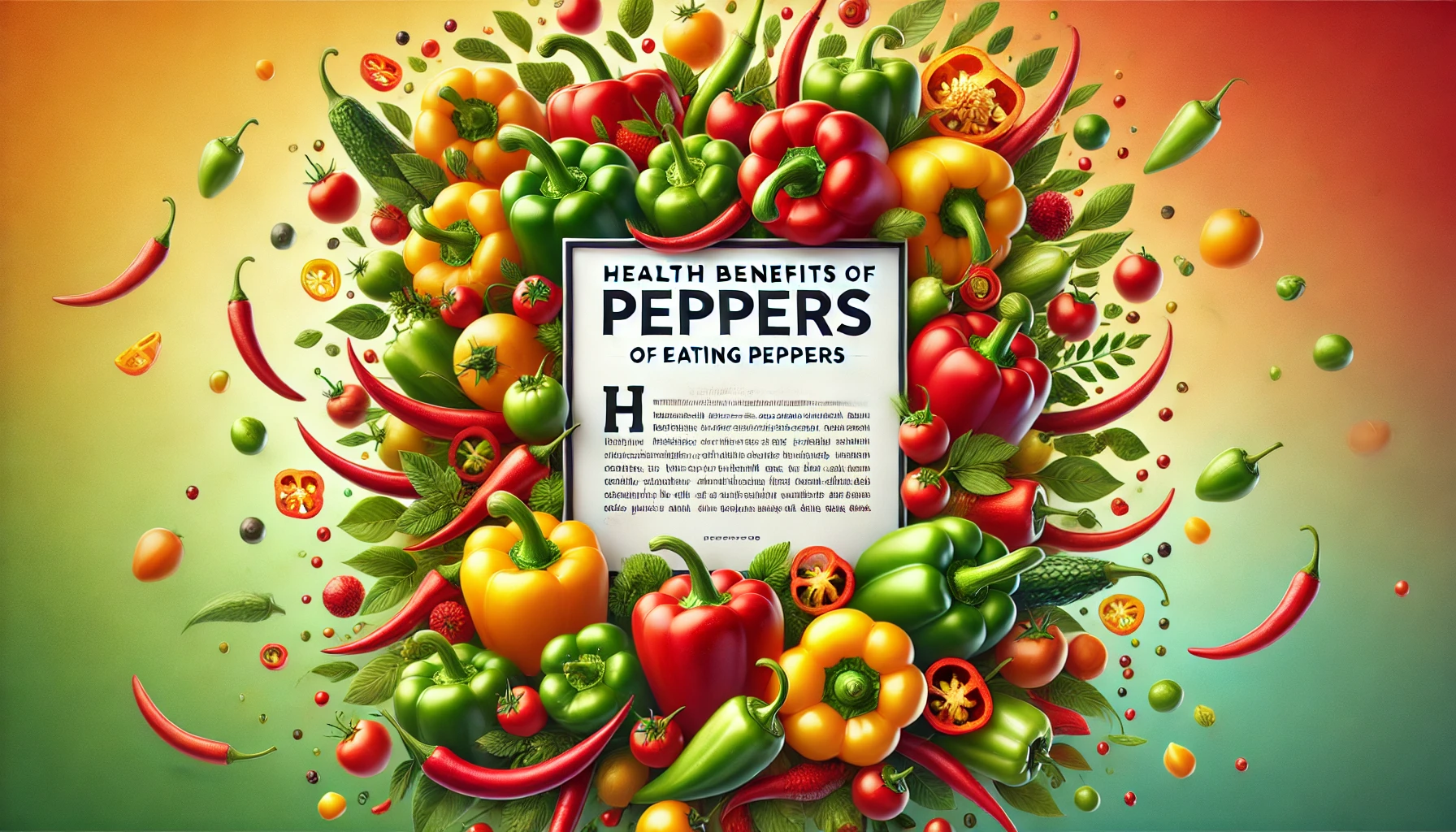Health Benefits and Side Effects of Eating Peppers, Nutritional value of peppers, Anti-inflammatory properties of peppers, Side effects of eating peppers, Benefits and risks of eating peppers
Peppers, whether sweet bell peppers or fiery chili peppers, are more than just a colorful addition to your plate. They are packed with nutrients and offer a wide range of health benefits. This article explores the various ways eating peppers can improve your health.
Rich in Vitamins and Minerals
Peppers are a fantastic source of vitamins and minerals. Here’s a quick look at what they offer:
- Vitamin C: Peppers are one of the richest sources of vitamin C, which is essential for a healthy immune system, skin, and wound healing.
- Vitamin A: Particularly in red peppers, vitamin A is vital for eye health and maintaining good vision.
- Vitamin B6: This vitamin helps in the production of neurotransmitters and red blood cells.
- Folate: Important for pregnant women, folate is crucial for proper fetal development.
- Potassium: Helps in regulating blood pressure and maintaining fluid balance.
Antioxidant Properties
Peppers are loaded with antioxidants, which help combat oxidative stress in the body. Some key antioxidants found in peppers include:
- Capsanthin: Particularly abundant in red peppers, it has powerful antioxidant effects.
- Quercetin: Found in many plants, quercetin can help reduce inflammation and oxidative damage.
- Lutein and Zeaxanthin: These carotenoids are essential for eye health and can help prevent cataracts and age-related macular degeneration.
Weight Loss Aid
Peppers can be a valuable addition to a weight loss diet. Here’s how they help:
- Low in Calories: Peppers are low in calories, allowing you to fill up without consuming too many calories.
- High in Fiber: The fiber content helps you feel full and satisfied, reducing overall calorie intake.
- Capsaicin: The compound that gives chili peppers their heat can boost metabolism and increase fat burning.
Anti-Inflammatory Benefits
Capsaicin, the compound responsible for the spiciness in chili peppers, has anti-inflammatory properties. This can help reduce symptoms in conditions such as:
- Arthritis: By reducing inflammation, capsaicin can alleviate pain and improve joint function.
- Nerve Pain: Topical capsaicin creams are often used to relieve pain from conditions like neuropathy.
Improved Digestive Health
Peppers can also support your digestive system:
- Fiber Content: The fiber in peppers aids in digestion and helps prevent constipation.
- Capsaicin: Though it can irritate some people’s stomachs, in moderation, capsaicin can help kill bacteria and stimulate digestive juices.
Heart Health
Eating peppers can contribute to a healthy heart in several ways:
- Lower Blood Pressure: The potassium content in peppers helps regulate blood pressure.
- Reduced Cholesterol: Some studies suggest that capsaicin can help reduce bad cholesterol levels.
- Anti-Inflammatory: Reducing inflammation is crucial for preventing heart disease.
Cancer Prevention
The antioxidants in peppers play a role in reducing the risk of cancer. They help protect cells from damage that can lead to cancer development. Capsaicin has been studied for its potential to kill cancer cells and inhibit their growth.
Better Vision
The vitamin A and carotenoids in peppers are essential for maintaining good vision. They help protect the eyes from damage and reduce the risk of eye diseases.
Enhanced Immunity
Vitamin C is vital for a robust immune system. Regular consumption of peppers can help your body fend off infections and illnesses more effectively.
Skin Health
The antioxidants, vitamins, and minerals in peppers contribute to healthy skin. They help protect against sun damage, reduce wrinkles, and improve overall skin texture.
Pain Relief
Capsaicin is known for its pain-relieving properties. It works by depleting the neurotransmitter substance P, which sends pain signals to the brain. This can be particularly effective for:
- Muscle Pain: Capsaicin creams are often used to relieve muscle pain.
- Joint Pain: It can help reduce pain in conditions like osteoarthritis.
Mood Enhancement
Eating peppers can also have a positive effect on your mood. Capsaicin triggers the release of endorphins, the body’s natural painkillers and mood enhancers.
Culinary Versatility
Beyond their health benefits, peppers are incredibly versatile in the kitchen. They can be eaten raw, cooked, stuffed, grilled, or roasted. This variety ensures you can include them in your diet in many delicious ways.
Potential Side Effects of Eating Peppers
While peppers are packed with nutrients and offer numerous health benefits, they can also cause some adverse effects, especially when consumed in large quantities or by sensitive individuals. It’s important to be aware of these potential side effects to enjoy peppers safely and comfortably. Here are some common side effects associated with eating peppers.
Digestive Issues
- Heartburn and Acid Reflux: Capsaicin, the compound responsible for the spiciness in chili peppers, can cause heartburn and exacerbate acid reflux in some individuals.
- Stomach Irritation: Eating spicy peppers can irritate the stomach lining, leading to discomfort, pain, or even gastritis in sensitive individuals.
- Diarrhea: Consuming large amounts of capsaicin can lead to digestive upset and diarrhea.
Allergic Reactions
- Skin Irritation: Handling hot peppers can cause skin irritation, burning, or redness. It’s important to wash your hands thoroughly after handling them and avoid touching your face.
- Allergic Reactions: Although rare, some people may have an allergic reaction to peppers, which can cause symptoms such as itching, swelling, and difficulty breathing.
Respiratory Issues
- Coughing and Sneezing: The strong, pungent smell of hot peppers can irritate the respiratory tract, leading to coughing, sneezing, and a runny nose.
- Asthma Triggers: In some cases, the capsaicin in peppers can trigger asthma symptoms or exacerbate existing respiratory conditions.
Gastrointestinal Discomfort
- Burning Sensation: Eating hot peppers can cause a burning sensation in the mouth and throat, which can be uncomfortable for some people.
- Nausea and Vomiting: Consuming very spicy foods, especially in large quantities, can lead to nausea and vomiting.
Interaction with Medications
- Blood Thinners: Capsaicin may interact with blood-thinning medications, potentially increasing the risk of bleeding.
- ACE Inhibitors: Capsaicin can also interact with certain blood pressure medications, such as ACE inhibitors, and may lead to an increased risk of coughing.
Irritation of Sensitive Areas
- Eye Irritation: If capsaicin comes into contact with the eyes, it can cause severe pain, burning, and temporary vision problems. It’s crucial to avoid touching your eyes after handling hot peppers.
Potential for Overconsumption
- Decreased Sensitivity: Regular consumption of very spicy foods can lead to decreased sensitivity to capsaicin, causing individuals to eat increasingly spicy foods, which may exacerbate the aforementioned side effects.
Conclusion
While peppers are a nutritious and delicious addition to many dishes, it’s essential to be mindful of these potential side effects. Moderation is key, and individuals with sensitive digestive systems or certain medical conditions should be particularly cautious. If you experience any severe or persistent symptoms after eating peppers, it’s best to consult a healthcare professional.



